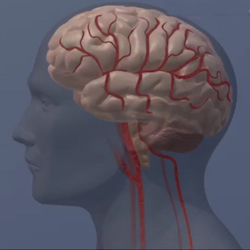
Older adults whose sleep is repeatedly interrupted are at increased risk of stroke and cognitive impairment, according to a newly published study in the American Heart Association’s journal Stroke. That’s because such “fragmented” sleep, whether it be from awakenings or arousals, is associated with hardened arteries and oxygen deprivation in the brain.
“The forms of brain injury that we observed are important because they may not only contribute to the risk of stroke but also to chronic progressive cognitive and motor impairment,” said Andrew Lim, M.D., the study’s lead investigator.
Lim and his colleagues came to their conclusions after examining the autopsied brains of 315 people who had undergone at least one full week of around-the-clock monitoring for rest or activity. The average age of those studied was 90, and 70% of them were women.
People’s sleep had been disrupted, on average, almost seven times each hour. In all, 29% of them had suffered a stroke, and 61% had signs of moderate to severe damage to their blood vessels in the brain.
The researchers found that greater sleep fragmentation was associated with 27% higher odds of having severe arteriosclerosis, or hardened arteries. Further, for each additional two arousals during one hour of sleep, there was a 30% increase in the odds that the study subjects had visible signs of oxygen deprivation in their brains.
These findings were independent of other cardiovascular risk factors, such as body mass, smoking history, diabetes and hypertension, or other medical conditions such as Alzheimer’s disease, pain, depression or heart failure, the researchers said.
 The study results can be viewed in several ways, said Lim, who is an assistant professor of neurology at the University of Toronto and a neurologist and scientist at Sunnybrook Health Sciences Center in Toronto. “Sleep fragmentation may impair the circulation of blood to the brain, poor circulation of blood to the brain may cause sleep fragmentation or both may be caused by another underlying risk factor,” he said.
The study results can be viewed in several ways, said Lim, who is an assistant professor of neurology at the University of Toronto and a neurologist and scientist at Sunnybrook Health Sciences Center in Toronto. “Sleep fragmentation may impair the circulation of blood to the brain, poor circulation of blood to the brain may cause sleep fragmentation or both may be caused by another underlying risk factor,” he said.
More research is needed, according to Lim and colleagues, but sleep monitoring ultimately may be another way to identify older adults who may be at risk of stroke.



